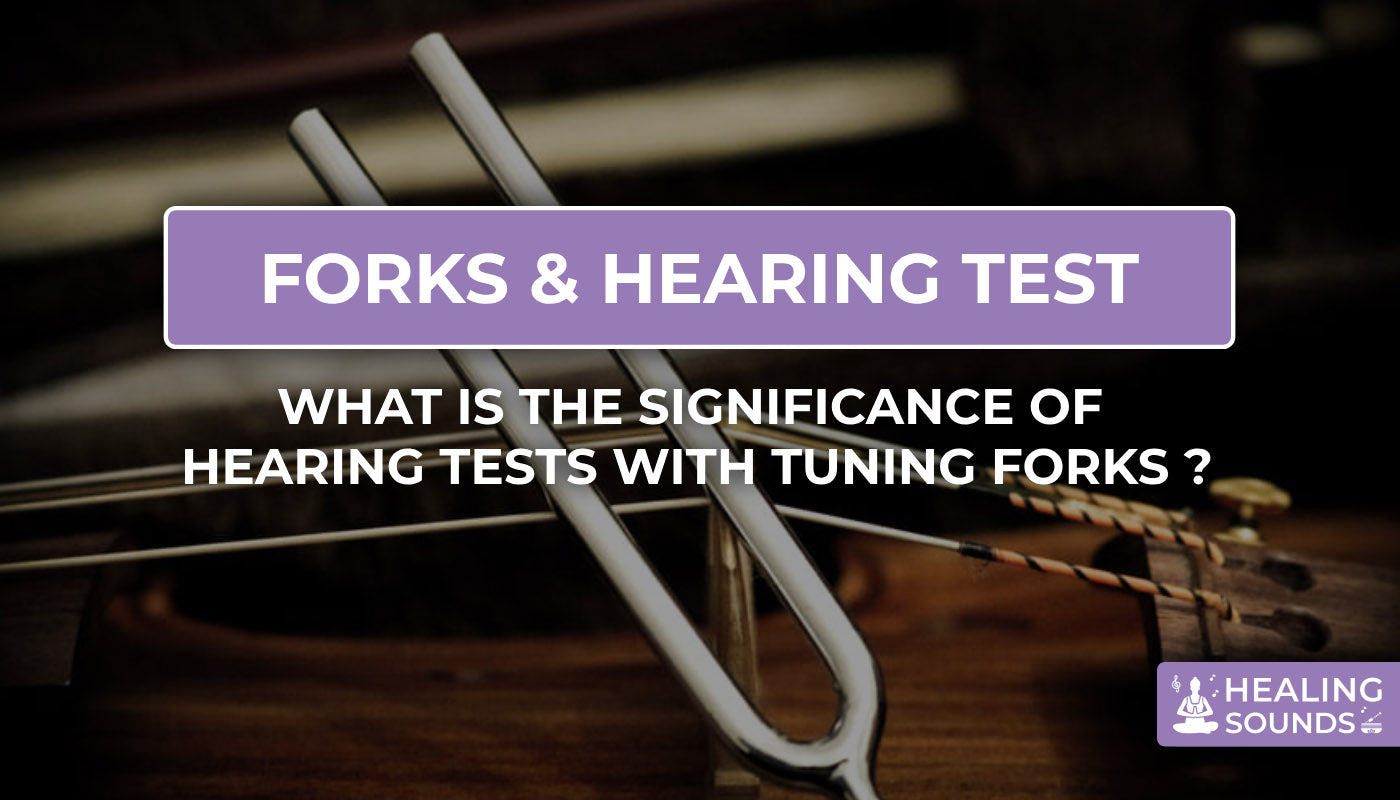Discover the fascinating world of tuning forks, precise instruments known not only for their role in music but also as vital tools in both clinical hearing assessments and holistic wellness practices. Whether you're an audiologist, a wellness practitioner exploring tuning fork therapy, or someone curious about hearing health, understanding how these simple devices work can be incredibly insightful. At Healing Sounds, we delve into the dual purpose of tuning forks, exploring their use in crucial hearing tests with tuning forks like the Rinne and Weber tests, alongside their applications in sound healing and energy balancing.

What Are Tuning Forks and How Do They Assess Hearing?
A tuning fork is a two-pronged metal resonator that vibrates at a specific, constant pitch when struck. This precise vibration creates sound waves that can travel through air (air conduction) or bone (bone conduction). Our ability to hear relies on both pathways: sound typically enters the ear canal (air conduction), eventually reaching the inner ear, but vibrations transmitted through the skull bones (bone conduction) can also stimulate the inner ear directly.
Hearing tests with tuning forks cleverly utilize these two pathways to help determine the nature and potential location of hearing loss. They are simple, non-invasive screening tools used for centuries.
The Science: Clinical Hearing Tests with Tuning Forks
Audiologists and Ear, Nose, and Throat (ENT) specialists commonly use two primary tuning fork tests: the Rinne test and the Weber test. These evaluations help differentiate between conductive hearing loss (issues in the outer or middle ear impeding sound transmission) and sensorineural hearing loss (damage to the inner ear or auditory nerve).
The Rinne Test Explained: Air vs. Bone Conduction
The Rinne test compares a patient's hearing sensitivity by air conduction versus bone conduction.
- The examiner strikes a tuning fork (commonly 512 Hz) and places the vibrating base on the patient's mastoid bone (behind the ear) until the sound is no longer heard (testing bone conduction).
- Immediately, the still-vibrating fork is moved close to the ear canal opening (testing air conduction).
- The patient reports if they can hear the sound again.
- Positive Rinne: Air conduction is heard longer/louder than bone conduction. This is normal or indicates sensorineural hearing loss.
- Negative Rinne: Bone conduction is heard longer/louder than air conduction. This suggests conductive hearing loss.
The Weber Test Explained: Lateralization of Sound
The Weber test helps determine if hearing loss is unilateral (affecting one ear more than the other) and suggests whether it's conductive or sensorineural.
- A vibrating tuning fork (again, often 512 Hz) is placed on the midline of the patient's forehead, scalp, or upper front teeth.
- The patient is asked where they hear the sound: in the middle, or louder in one ear.
- Normal Hearing: Sound is heard equally in both ears (midline).
- Unilateral Conductive Loss: Sound is heard louder in the poorer ear (due to occlusion effect masking ambient noise).
- Unilateral Sensorineural Loss: Sound is heard louder in the better ear.

512 Hz Medical Tuning Fork Instrument
39.90€ 79.90€
Essential for accurate Rinne and Weber hearing tests, the 512 Hz tuning fork is a standard in audiological screening and basic diagnostics.
Explore 512 Hz ForkWhy Use Tuning Fork Tests Today? Accuracy and Purpose
While modern audiometry provides detailed hearing thresholds, tuning fork tests remain valuable. ENTs use them for quick, initial bedside assessments, especially when sophisticated equipment isn't readily available. They offer crucial qualitative information about the type of hearing loss, guiding further diagnostic steps.
Although not as precise as a full audiogram, when performed correctly, the Rinne and Weber tests (particularly using a 512 Hz tuning fork) provide reliable diagnostic clues. For more insight into their clinical relevance, refer to resources like the overview provided by the National Center for Biotechnology Information (StatPearls on Tuning Fork Tests).
Beyond Diagnostics: Tuning Forks in Sound Therapy
The applications of tuning forks extend far beyond clinical diagnostics into the realm of holistic wellness and tuning fork therapy. The same principles of vibration and resonance are harnessed for relaxation, energy balancing, and promoting a sense of well-being. Different frequencies are believed to interact with the body's energy fields and physical structures in unique ways.

Weighted vs. Unweighted Forks for Different Applications
Understanding the difference between weighted and unweighted tuning forks is key to selecting the right tool for therapeutic use:
- Weighted Tuning Forks: These forks have weights added to the ends of the prongs. This lowers their pitch and causes the vibration to be felt more strongly, lasting longer when the stem is placed directly on the body. They are excellent for stimulating nerves, relaxing muscles, and working directly with physical tension or bone resonance (similar to bone conduction in hearing tests). Examples include Otto Tuners (like 64 Hz or 128 Hz) used for grounding and deep relaxation.
- Unweighted Tuning Forks: These forks produce a clearer, purer tone with stronger overtones, radiating sound more effectively through the air. They are typically used around the body in the energy field (aura) or near the ears for auditory stimulation, making them ideal for chakra balancing, meditation, and energetic clearing.
Explore Weighted Tuning Forks for Therapy

Professional Otto Tuners Weighted 4 Tuning Forks Set
99.90€
129.90€
This set includes weighted forks like 64Hz and 128Hz, ideal for applying deep vibrations directly to the body for relaxation and releasing tension. Learn more ➔

136.10 Hz Weighted Tuning Fork with Crystal Handle
39.90€
79.90€
Experience the resonant calm of the OM frequency (136.10 Hz) with this weighted fork, perfect for grounding, heart-centered meditation, and promoting emotional harmony. Learn more ➔
Frequencies for Well-being
Specific frequencies are often associated with particular therapeutic benefits in tuning fork therapy. For example, the 136.10 Hz frequency (often called the "OM" frequency) is linked to the Heart Chakra and believed to promote feelings of peace and connection. Lower frequencies, like 64 Hz, are sometimes used to help balance the nervous system and release deep-seated physical tension.
Choosing the Right Tuning Fork
Whether for clinical use or personal wellness, the quality of your tuning fork matters. Look for forks made from high-quality aluminum alloy, precisely calibrated to ensure accurate frequency. At Healing Sounds, our tuning forks are crafted for durability and tonal purity, suitable for both discerning professionals and individuals beginning their sound healing journey.
Conclusion
Tuning forks are remarkably versatile tools, bridging the gap between objective medical assessment and subjective wellness experiences. From the critical diagnostic insights provided by the Rinne and Weber tests using frequencies like 512 Hz, to the deep relaxation offered by weighted forks in tuning fork therapy, these instruments harness the power of vibration.
Understanding both the scientific basis of hearing tests with tuning forks and the potential benefits of sound healing allows for a comprehensive appreciation of these resonant tools. Explore the carefully curated collection at Healing Sounds to find the perfect tuning forks for your clinical or therapeutic needs.
Frequently Asked Questions about Hearing Tests with Tuning Forks
The primary hearing tests done using tuning forks are the Rinne test and the Weber test. These tests help differentiate between conductive hearing loss (problems in the outer or middle ear) and sensorineural hearing loss (problems in the inner ear or auditory nerve).
Tuning forks are primarily diagnostic tools used to identify the type and possible location of hearing loss, rather than treating it directly. They help healthcare providers understand the nature of the hearing problem. While tuning fork therapy may promote relaxation and overall well-being, it is not a cure for hearing loss itself.
Tuning fork tests are valuable clinical screening tools, especially for bedside evaluations or when formal audiometry is unavailable. While not as quantitatively precise as an audiogram, they provide reliable qualitative information about the nature of hearing loss (conductive vs. sensorineural) when performed correctly, typically using a 512 Hz tuning fork. Their accuracy depends on proper technique and examiner experience.
An ENT (Ear, Nose, and Throat specialist) uses a tuning fork for quick, preliminary hearing assessments. The tests help them distinguish between conductive hearing loss (sound blocked in the outer/middle ear) and sensorineural hearing loss (inner ear/nerve issue). This initial information guides further diagnosis and appropriate management strategies.
The purpose of using a tuning fork in an ear examination is to evaluate basic hearing function by comparing air conduction (sound traveling through the ear canal) and bone conduction (sound transmitted through skull vibrations). This comparison helps identify the potential site of a hearing impairment (outer/middle ear vs. inner ear/nerve pathway).


